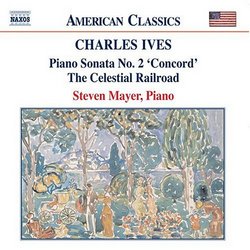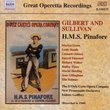| All Artists: Spoken Word, Charles Ives, Henry David Thoreau, Steven Mayer Title: Charles Ives: Piano Sonata No. 2 'Concord'; The Celestial Railroad Members Wishing: 0 Total Copies: 0 Label: Naxos American Release Date: 8/17/2004 Genres: Special Interest, Classical Styles: Chamber Music, Forms & Genres, Sonatas, Historical Periods, Classical (c.1770-1830), Modern, 20th, & 21st Century Number of Discs: 1 SwapaCD Credits: 1 UPC: 636943922125 |
Search - Spoken Word, Charles Ives, Henry David Thoreau :: Charles Ives: Piano Sonata No. 2 'Concord'; The Celestial Railroad
 | Spoken Word, Charles Ives, Henry David Thoreau Charles Ives: Piano Sonata No. 2 'Concord'; The Celestial Railroad Genres: Special Interest, Classical
|
Larger Image |
CD DetailsSimilar CDs |
CD ReviewsA Transcendent 'Transcendental' Sonata J Scott Morrison | Middlebury VT, USA | 09/06/2004 (5 out of 5 stars) "I've never heard a bad performance of Ives's 'Concord' Sonata, except perhaps for my own fumbling attempt at the 'Alcott' movement at a musical soirée many years ago. (Ruth Laredo, when she heard I was working on the sonata, said that she would have assumed it was beyond me, and she was right, alas.) Further, I've never encountered a bad recording of it, and I've heard them all except for the one by Alexei Lubimov. All have their strong points and one simply won't go wrong with any of them--John Kirkpatrick, Gilbert Kalish, Pierre-Laurent Aimard, the one by Marc-André Hamelin from the early 1990s. Not long after this review appears here at Amazon, Hamelin will have released a new recording of it (coupled with the Barber Sonata) and I would be willing to make book that it is a corker. So, what could Steven Mayer bring to this piece that others haven't? Well, first of all, he has the chops to pull it off--his playing of Art Tatum's music would have led one to expect that--but, more, he has the musicianship to breathe life and import into these notably dense movements. The knotty 'Emerson' movement is written largely without bar lines and on three staves; it is scary for a pianist to contemplate, much less understand and then make music of. Mayer does this at least partly by maintaining a steady pulse from which he can vary as needed and then return to; some pianists don't manage this, but Mayer's approach to tempi gives the movement a cohesion that is difficult to convey. He takes Ives's direction to play 'Hawthorne' as fast as possible with a grain of salt, and that is a plus; it allows the music to make an appropriate blur without being a scrambled mess. 'Alcott' is played with love and nostalgia but without saccharine sentimentality. The hymn tune 'Jesus Lover of My Soul' ('Martyn') makes an appearance and is somehow connected harmonically with the quotation from Beethoven's Fifth that pops up all through the Sonata. 'Thoreau' is played with quiet intensity and in the long final section Ives does what he does so often: he presents a fairly straightforward rendition of a tune that has been hinted at all through the sonata, but never quite stated as such until the conclusion, a sort of variations-leading-to-a-theme, a kind of 'coming home.' In this case the theme is original with Ives and he himself referred to it as the 'human faith melody.' The Sonata is followed by pieces that are mostly related to it. 'Varied Air and Variations'--the suggestion has been made that this odd title is Ives's pun on its pronunciation: 'Very Darin' Variations'--does not appear to have motivic relation to the sonata, but it is speculated that this angry-sounding piece, written not long after the Sonata, is his response to the Sonata's failure to secure performances. 'The Celestial Railroad' is a major recasting of the 'Hawthorne' movement inspired by Hawthorne's short story of that name. And the 'Emerson Transcription, No. 1' (one of four such tinkerings with the Sonata's first movement) is based on the movement's first page or so and includes material from his orchestral 'Emerson Overture.' Mayer plays them all marvelously. I particularly enjoyed his hearty abandon in 'The Celestial Railroad'; simply superb pianism! Well, what should one do with so many good recordings of the 'Concord'? The simple answer is to buy them all. But I recognize most music-lovers won't go that far. Is there anything that sets this release apart, aside from the remarkable playing by Mayer? First, there is the attractive Naxos budget price. And, second, there is the reading by actor Kerry Shale, before each of the Sonata's four movements, of appropriate excerpts from Ives's own writings about the people who inspired the work. Attractive in themselves, these selections are probably not something one would want to listen to each time one hears the Sonata, but fortunately they are tracked separately and thus can be programmed out of a straight listen-through of the Sonata itself. Strongly recommended. TT=79:09 Scott Morrison" Ives's "Hammerklavier" Robin Friedman | Washington, D.C. United States | 09/13/2004 (5 out of 5 stars) "In its size, ambition, difficulty, breadth, and seriousness of purpose, Charles Ives's Piano Sonata No. 2, "Concord, Masachusetts 1840-1860" reminds me of Beethoven's great piano sonata op. 106, the "Hammerklavier". The work includes extensive quotation from Beethoven, not from the "Hammerklavier" but rather the motto of the Fifth Symphony, a work much in the spirit of the "Hammerklavier". With the Concord sonata, Ives wrote a truly monumental work; difficult but a mainstay of American music. One of the early reviewers of the Concord, Larence Gilman, wrote in 1939: "This sonata is exceptionally great music-- it is, indeed, the greatest music composed by an American and the most deeply and essentially American in impulse and implication. It is wide-ranging and capacious. It has passion, tenderness, humour, simplicity, homeliness. It has imaginative and spiritual vastness. It has wisdom and beauty and profundity, and a sense of the encompassing terror and splendor of human life and human destiny -- a sense of those mysteries that are both human and divine" (Quoted in Jan Swafford's "Charles Ives: A Life with Music, p. 411) Not all critics, then or now, share Gilman's enthusiasm for the Concord. But I listened several times to this CD, performed by pianist Steven Mayer, and was transported. The United States has indeed produced great art music. The Concord has the traditional four movements of the classical or romantic sonata. Each movement celebrates a great figure who lived in Concord during the early American Renaissance. The music looks backward to the achievements of these figures and forward to what America collectively and the individual listener might become. On this CD, each movement is prefaced by short quotations from the subject of each of movement, or by Ives himself. I found this helpful in approaching the work. It also encourages the listener to approach each movement separately, which is a reasonable way of becoming acquainted with the Concord. The first movement is the most difficult in the work and is titled "Emerson". The movement opens with dominant chords in the bass accompanied by high,rising passages in the upper register of the piano. These passages become the basis of the entire work. As befitting Emerson, (and Ives) the work is visionary, questing, searching, and quirky all at once. Large agressive heavy chords and dissonances alternate throughout with slow and meditative moments. The second movement, "Hawthorne" is a scherzo. It emphasizes Hawthorne's romantic, fanciful side while down-playing Hawthorne's puritan sense of sin. The music shimmers and swirls and, as it progresses, contrasts brief sections of lyricism with burly dissonant writing. A march lights up the concluding sections of this work. Ives' short piece "The Celestial Railroad", also included on this CD, is a variant of the Concord's "Hawthorne" movement. The third movement "the Alcotts" stresses the domestic tranquillity of the family rather than Bronson Alcott's transcendent philosophical speculations. The movement opens slowly with a chorale, simple theme and gradually builds to an intense climax. This movement makes great use of the motto from Beethoven's Fifth Symphony. The final movement, "Thoreau", is the slowest of the work. It opens with soft-upward arpeggios, grows in intensity, and ultimately works to a quiet close. This movement is based upon a hymn-like theme that, in fact, appears throughout the entirety of the Concord. In addition to the Sonata itself, the CD includes three works that are associated with the Concord and that are built from its music: "The Celestial Railroad" which I mentioned earlier, the first of a set of transcriptions that Ives prepared from the "Emerson" movement, and a sardonic work titled "Varied Air and Variations." The Concord is music uniquely modern, spiritual, and American. The sense of the work shines through its bristling idiom. Jan Swafford has written that: "Rarely in music have the unseen and unspoken mysteries of life seemed so imminent-from Emerson's heroic journey, to Hawthorne's "ghost of a man who never lived, " to the Alcott's "conviction in the power of the common soul, " to Thoreau's melody that "runs into such depth and wildness as to be no longer heard." ... The Concord Sonata is another Ivesian signpost pointed toward the ultimate millenium." (Jan Swafford, Charles Ives: A Life with Music", p.266) This CD is part of the Naxos "American Classics" series and, more specifically, is the fifth CD in this series devoted to the music of Charles Ives. The CD sells at a budget price. Ives appears to me the essential American composer. Ives captured his sense of our country and combined it with a personal spiritual vision in music in the way that Walt Whitman endeavored to capture the United States, the sense of the personal, and a spiritual vision in his poetry." Excellent Performance of Great Music Wizkid | USA | 08/22/2006 (4 out of 5 stars) "The "Concord" Sonata is one of Ives' greatest works, and this is an excellent performance of it. To my ear, it lacks the very last touches of Ives' American humor and unsentimental transcendentalism, though it does manage to avoid egregious Romanticism and antiseptic "classicism." I may be romanticizing myself in imagining that the best performance of this great music was that of Ralph Kirkpatrick, Ives' student at Yale, which I heard years ago on CBS vinyl (still not available on CD, as far as I know). I have not heard the other recent recordings of this work, so my review cannot offer comparisons. This disc offers excerpts from Ives' excellent "Essay Before a Sonata," read by a professional actor between the movements. The readings betray several failures of understanding on the part of the actor but give at least a taste of Ives' ideas in prose."
|

 Track Listings (11) - Disc #1
Track Listings (11) - Disc #1
